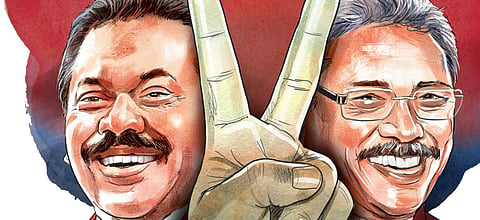

Wednesday’s parliamentary polls held no surprises for Sri Lanka watchers. The election has ensured continuity along with political stability that the island nation got with the election of President Gotabaya Rajapaksa in November last. Sri Lanka needed stability for ensuring national security and economic revival, and ending the constitutional impasse in the wake of last year’s Easter Sunday serial blasts and more recently the Covid-19 pandemic.
With strategic Tamil and Muslim allies, the ruling SLPP-led combine of Rajapaksas (President Gotabaya and Prime Minister Mahinda, a two-term President earlier) has won a two-thirds majority, or 151 seats (including the Speaker) out of a total of 225. Equally important, the poll has sounded the death knell for the nation’s two oldest parties. The United National Party (UNP), Sri Lanka’s GoP, lost badly to the breakaway SJB headed by ex-deputy Sajith Premadasa, son of former President Ranasinghe Premadasa who was slain by the LTTE. The UNP’s long-time boss and three-time PM Ranil Wickremesinghe too could not make the grade.
The UNP’s traditional rival, the Sri Lanka Freedom Party (SLFP), was weakened after the Rajapaksas walked out to found the SLPP. The party now won a single seat, from the Tamil North, the first in 40 years. The party’s former President Maithripala Sirisena could win his parliamentary seat from his native Polonnaruwa district only by contesting on the Rajapaksa SLPP’s ‘Lotus Bud’ symbol. Indian concerns: Interestingly, Sri Lanka’s immediate concerns are also those of neighbouring India’s for its southern neighbour. The Sri Lankans have given themselves political stability after five years of failed experimentation with a patently unhappy wedding of inconvenience.
The unsuccessful cohabitation between former president Sirisena and PM Wickremesinghe was also the main cause for the nation’s multiple woes, barring Covid of course. Before the Easter Sunday blasts last year, India had provided intelligence all through. Yet, New Delhi had to sit it out when the Sri Lankan establishment did not even send out an extra police constable to the streets on the fateful day, 21 April 2019. Inquiry commissions have since attributed it to the lack of communication between the top two in the government,
Even without it, Sri Lanka’s economy was tottering, also due to the previous Rajapaksa regime’s profligacy, leading to what amounted to a ‘debt trap’ involving China. The new government talked of containing the debts, but kept borrowing from China for even non-essential expenditure like building more expressways. But the Easter blasts hit the nation’s tourism economy. Just when there were signs of revival, the pandemic struck.
India cannot afford a failed economy in its southern neighbourhood too for more reasons than one. Ahead of the polls, India committed itself to a $400 million currency-swap facility sought by the new regime in Sri Lanka. Their request for an additional $1.1 billion swap facility and three-year moratorium on around $900 million in loans are under continuing negotiations. So possibly is India’s engagement with developing the Colombo Port Eastern Container Terminal. The previous government had signed a tripartite deal that also included Japan, but the current rulers are under pressure from labour groups and self-styled Sinhala-Buddhist supra-nationalists to rescind it.
Baby and the bathwater: India has a more direct involvement in terms of the revival and possible implementation of the 13th Amendment to the island nation’s Constitution, effected as far back 1987—or a version suited to the times. India’s hopes of helping to find a peaceful conclusion to the ethnic strife did not bear fruit. After three decades of war and violence and the militarily forced exit of the LTTE, 13-A is still the only valid document for the nation’s Tamil minority to cling on to. Owing to India’s later-day disposition to the LTTE, there are those in Sri Lanka’s Tamil community and polity who have thrown the baby with the bathwater.
The parliamentary polls have weakened the multi-party Tamil National Alliance (TNA), with a much lower 10 MPs. Their voice is not the ‘sole authorised and authoritative voice’ of a majority of Tamils anymore. Two hard-line Tamil nationalist parties have won three seats between them: Former Supreme Court judge C V Wigneswaran has won a lone seat for the Tamil People’s Alliance (TPA) and Gajendra Kumar Ponnambalam’s Tamil National People’s Front (TNPF) has got two. Three pro-Rajapaksa Tamil parties in the North and the East have won a total of four seats.
This has made the post-poll revival of ethnic negotiations more complex and uncertain. It has also come in the midst of the Rajapaksas’ eagerness to fast-track other promised ‘constitutional reforms’ on restoring executive power, haphazardly taken away under the predecessor regime’s 19th Amendment, that too when the iron is still hot. Linked to the political solution for the ethnic issue is the UNHRC resolution on a war crimes probe that will come up for a crucial vote in March next year. Nearer home, civil society is concerned about the possible return of authoritarianism, securitisation and worse—but that is for the people to vote upon, when the much-delayed elections to the nine Provincial Councils are held sooner than later.
N Sathiya Moorthy
Distinguished Fellow and Head-Chennai Initiative, Observer Research Foundation
(sathiyam54@nsathiyamoorthy.com)